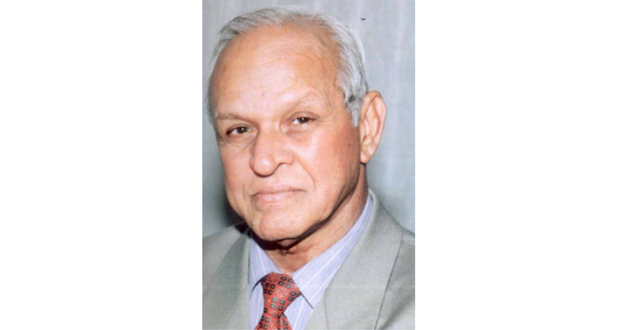…urges govt to get right people in the job
ICONIC Guyanese business executive Dr Yesu Persaud Friday blamed “all Guyanese” for the collapse of the critical sugar industry.“This industry was destroyed by all of us because we allowed it to happen,” Persaud said during a meeting between officials of the employers’ organisation, the Consultative Association of Guyanese Industries (CAGI) and Minister within the Ministry of Social Protection, Mr Keith Scott.
Friday’s meeting was held at Minister Scott’s Brickdam, Georgetown office. Persaud, a leading CAGI official, said prolonged negligence by senior Guyana Sugar Corporation (GUYSUCO) officials precipitated the ruin of the sweetener industry. In part, GUYSUCO’s decision-makers paid almost exclusive “attention to the factory but ignored the field.” Guyanese, the retired businessman said, were paying the price for this blunder. He predicted though that if field practices were favoured again, yields could improve again.
Persaud reminded Scott that sugar was a sensitive industry and the government must “for heaven’s sake get the right people…and right advice (lest it) fall into a trap.” “We can’t allow this industry to die, we have to find a way to save it,” Persaud pleaded with Scott.He flayed the national indifference when news of the imminent closure of Wales Sugar Estate was announced suddenly by the government. The West Demerara estate is scheduled to be closed at the end of 2016.In Persaud’s estimation, “the wrong people in the wrong job” precipitated the floundering and eventual collapse of the Wales estate.“I find it depressing that the industry that brought all of us here is in this state. To see it die would be a tragedy, Persaud lamented.
The Guyanese sugar industry is the single largest employer with some 18,000 persons directly and indirectly attached to the sector rooted in the trans-Atlantic slave trade and later indentureship.Sugar is simultaneously, a significant foreign exchange earner and user, and, is by far the single largest beneficiary of annual subvention from the local treasury. In the last five years, the industry has gobbled up annually, an average G$10 billion of tax-payers’ dollars. The industry however can’t compete on the international market because of European Union (EU) unilateral chop in the price for sugar and the huge cost of production for the GUYSUCO product. While the cost of production for Guyana’s sugar is 24 cents, the price on the world market is almost 50 per cent below that at 13 cents.
When he addressed the issue, Minister Scott said Guyana must look to the Berbice estates to help reduce the cost of production to match the selling price of sugar on the global market. Otherwise, “other estates will have to be closed,” Scott warned.
Scott noted that while Guyana had no bargaining influence for the price of sugar on the international market the country had to find a way to be competitive against beet and other sweeteners used abroad.Persaud lamented that several estates – for example, Leonora, Diamond, Ruimveldt and Houston – among others were in the past closed “willy nilly” while some had the potential to contribute significantly to the local economy. The current crisis in the local sugar sector was also triggered by Guyana’s bypassing of several regional markets for its sweetener in preference to Europe. “This was an error,” Persasud reasoned.
Sugar workers and employees’ organisations here think that closing the Wales estate is an error by the 10-month old government. While sugar workers protested the planned closure of the West Demerara estate, Scott said the APNU/AFC coalition administration was pushing for a “stable industrial climate” here.
As Minister with the Labour portfolio, Scott said his current challenge is to “avoid the mistakes of the past.” Since he has assumed the Labour portfolio, Minister Scott has been holding talks with a number of local stakeholders and foreign investors.
Scott reckoned that Guyana “is the land of the future,” and said he would be pushing for a stronger partnership with investors.
While Persaud castigated Guyana’s 50-year old clampdown on free expression by nationals which forced many overseas, Scott noted that the Republic was currently in the “season of free enterprise (and expression”) and there was a clear direction where the government was heading and how it plans to accommodate development of the economy.



